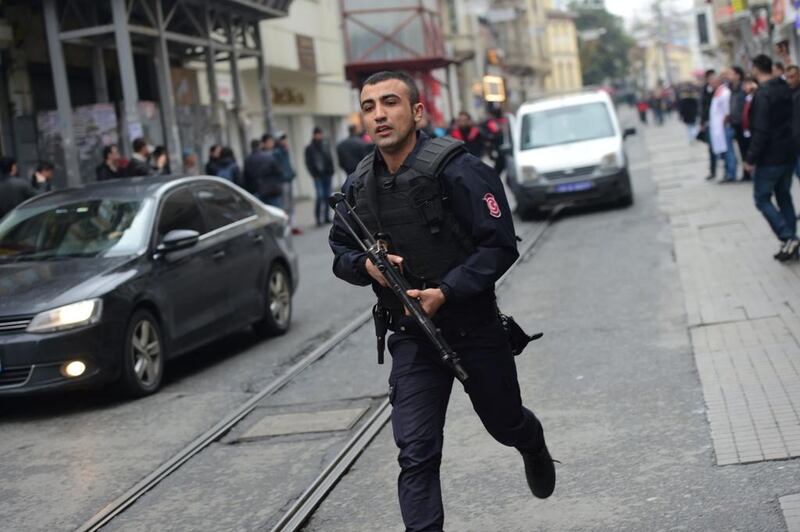Istanbul // Four people were killed and dozens injured, including a person from Dubai, in a suicide bombing in central Istanbul on Saturday, less than a week after an attack by claimed by Kurdish rebels left 35 dead in Ankara.
The sixth major attack in Turkey since July targeted Istiklal Caddesi, a pedestrian thoroughfare in the European side of the city that is usually thronged with shoppers and strollers but was still relatively quiet when the bomber struck at around 11am.
“This is a suicide attack, a terrorist attack,” Istanbul governor Vasip Sahin said, giving a toll of four dead besides the bomber.
The victims were named as Israelis Simha Siman Demri, 60, Yonathan Suher, 40, Avraham Goldman, 70, and Iranian national Ali Riza Khalman, 31, according to CNN-Turk.
Health minister Mehmet Muezzinoglu said 36 people were injured, seven seriously. They include six Israelis, two people from Ireland and one each from Germany, Iceland, Iran and Dubai.
Security camera footage circulated by Turkish media showed a man wearing a long coat approaching a small group of people outside a local government building directly before the blast.
Mr Sahin said the building appeared to be the intended target.
No group had yet claimed responsibility for the attack.
A large stretch of the street was evacuated after the attack. Armed police sealed off the area as ambulances ferried the injured to hospital and a police helicopter hovered overhead.
A waiter at restaurant near the blast site described the scene as “people lying all about, it was carnage”.
Prime minister Ahmet Davutoglu called an emergency security meeting in Istanbul after the attack.
Deputy prime minister Numan Kurtulmus was among the first senior officials to react, saying the government would “not yield in the face of terrorism” and expected “unqualified support from those who call themselves Turkey’s friends” – an apparent reference to recent criticism in Europe of president Recep Tayyip Erdogan.
The United States said it stood in solidarity with Turkey in combating “the common threat of terrorism”, describing the attack as the latest in a series of “indefensible violence targeting innocent people” throughout Turkey.
Germany’s foreign ministry urged citizens in Istanbul to exercise extreme caution and remain close to their hotels.
Turkey, which has been rocked by a string of attacks since last summer, some the work of ISIL and others claimed by Kurdish rebels, had been on high alert ahead of Kurdish New Year celebrations on Monday.
One rebel group, the Kurdistan Freedom Falcons (TAK), had claimed responsibility for a March 13 attack on a busy transport hub in Ankara that killed 35 people.
The TAK, which also claimed a suicide bombing in Ankara in mid-February that killed 29 people and had staged a suicide attack in the area of Saturday’s bombing back in 2010, has ties to the outlawed Kurdistan Workers’ Party (PKK) against which the Turkish army is engaged in a major offensive.
The TAK said last week’s Ankara bombing by a 24-year-old female student was to avenge members of the Kurdish minority killed during the military’s battle against the PKK.
Turkey has also been repeatedly targeted in recent months by ISIL members operating out of neighbouring Syria.
ISIL was blamed for three of the last six attacks, including a suicide bombing in January in Istanbul in which 12 German tourists were killed and an attack on a peace rally in Ankara in October that claimed 103 lives.
On Thursday, Germany closed its embassy in Ankara, its consulate in Istanbul and German schools in both cities, citing “very serious” indications of planned attacks against its missions.
The US embassy in Ankara had also warned its citizens in Turkey to avoid public gatherings during the Kurdish New Year holiday.
Embarrassed by accusations of security lapses, Mr Erdogan has called for journalists, activists and intellectuals who criticise the army’s tactics in battle-scarred Kurdish towns and cities to be designated “accomplices” of terror, causing an outcry over dwindling free speech.
The Turkish military meanwhile carried out fresh air strikes against PKK hideouts across the border in northern Iraq on Friday and Saturday, the army said.
The PKK resumed its three-decade-long insurgency against the Turkish state last summer following the collapse of a shaky two-year ceasefire.
The conflict has claimed some 40,000 lives in over the decades.
* Agence France-Presse





